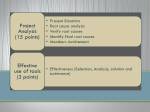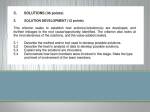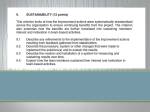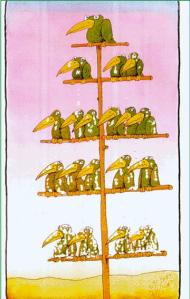Sustenance – The Common Problem. This is a common problem in many organisations that launch WITS. I used to think that making improvement is such a noble thing to do when one is a responsible worker. Don’t you agree that it is just ethical to make the company we serve a better one? That we can be proud of ? Since WITS activities occupy such a high moral ground, then why is WITS so difficult to sustain?

It’s a Common Problem – Don’t panic!~
This Problem – Also happening in Japan. Over the years, I have seen many companies – including those which started out on the right footing, those that had the best of senior management support, good intentions all round. They continue to have this problem of sustenance – of keeping WITS alive.
Many years ago, (I think it was in 1986), the National Productivity Board invited several QCC Experts from Japan to advise and deliberate on this issue. I learned that in Japan, they too had this same problem. So even Japan, the originator and being the original master of QCCs, have this problem too!

Japan -Birthplace of QCC (and WITS)
Lessons From A Humble Charcoal Stove. Before I suggest ideas for you to tackle your sustenance issue, I would like to draw an analogy.

Charcoal Stove
No too many years ago, kitchen stoves use wood or charcoal. My childhood experiences include helping my mother start the fire with little twigs and kerosene. To make sure the fire in our stove is still burning, I periodically check by peeking through the little ‘sliding window’ at the bottom. Every now and then, I add pieces of charcoal to make sure that our food do not end up half cook. I fan the stove if the fire is dying. Our elders used to boast that with their experience, they know the exact amount of charcoal to use. That is the amount that gets your rice cooked when the charcoal burns out – synchronised and optimised. They already know the concept of that two terms without attending business school.

‘Bak Chang’ Taste Better With Charcoal
When it comes to ‘Bak Chang’, you have no choice but to monitor the flame, because it literally takes a few refills of good old charcoal before your dumplings are fully cook.
This is exactly the thing that we should do to keep your WITs teams alive – check on them periodically.
Super Convenience, Something Is Lost. During one of my conversations with a manager friend of mine, he jeered at me and tried to destroy my analogy. He said that I am behind time with that analogy. He suggested to me to update myself.
“Today, the world is very progressive,” according to him, ” it is so different. We are using gas from tanks to cook! Most of us even have the extra convenience of directly connecting to pipe-in gas. Some better off ones have totally converted to super clean electrical heating. Electricity is a quick, clean and ‘limitless’.

Piped In Gas Meter.
“Our WIT teams should be like that. They should be easy to switch on and off. They must reach a stage of self-perpetuating, self-motivating, self-initiating; then we can call the teams successful teams. That is what I need here.”

Squeaky Clean Electric Stove
Outside Help, Modern Crutches. Perhaps many of the new managers really think that way. They, having grown up, pampered and surrounded by modern gas and electrical conveniences have missed what they could have learn from the humble kitchen charcoal stove.
My seven year old son only learned about open ovens when I brought him to Kenny Rogers one day. There the meat is flame-broil! He admitted that they do indeed taste better! He connect it to BBQ, a one-off picnic!

Gas Delivery In Iraq

They Say This Is How It Is Done In India!
This is what one learns from electrical ovens. If the oven fails to light up, all you need to do is to check if the switch is on, and if the switch is on and it didn’t work, you really cannot do much. You just go to the yellow pages and look for a technician or unplug and send it to the nearby electrician. And if your gas tank is empty, you just change them.

Modern Crutches – That Is What We Learn
Root Cause. Hey presto, that is one root cause of inactive WITS! If managers think of convenience, and that we have progress until we are programmable, they are wrong. You see they have over-simplified management. Their motto : “Once there is a problem, don’t waste time, seek outside help.” (In fact, this is a good thing for consulting business. We consultants love outsourcing. Perhaps I should not kill the goose that lay the golden egg. I should not have blogged on this golden goose…)
But seriously, changing without investigation is not what WITS management is about.

Enjoy This Series?
Naturally Human, We Want Care. Let me go to the basics of WITs Management. The human specie of today has been genetically duplicated and copied many millions of years ago. We are just naturally and totally human from day one. Nothing much really change in us. We do look a lot like our great-great-great forefathers. Look at Ghengis Khan’s pictures in ancient drawings. He does look like some of my Korean friends to day! In all fairness, there is not much change in the way our brain works either, except that the input may be different, the hardware and processing of information did not change. The way our arms stretch out to grasp things and the way our legs prop us upright have been that way for centuries or more.

We Need Friends Who Care

We Care For Others
Now the connection. Not unlike our forefathers, we are only able to digest certain types of food, plants or animals. More importantly, we continue to enjoy hanging around with other people, like our forefathers used to during their time. In teams they hunt, today, in teams we earn.
We still enjoy sharing, competing and winning, and we learn lessons through success and failures. We feel the same kind of grief from pain and loss, and elation on triumph.
Finally, we all love to be loved and prefer our friends to think fondly of us than scheme against us.

We All Belong To The Human Corporation.
WIT Team, Human Corporation. The WIT team is really a human corporation. It cannot be otherwise. Human beings needs friendship and love. The social instinct in us doesn’t expire, w need interaction with others to be inspired (Remember Forest Gump).
We Are Naturally Unstable. You cannot set people to automatic mode; simply because as human beings we were not meant to work consistently. Human beings are naturally unstable. Don’t get me wrong, all of us like stability and consistency, but because we are natural, we can never remain stable for very long ( after all we are all sinners!). As human beings, we will either improve or go downhill, we cannot remain constant for lon. What I am saying is that we resemble the charcoal stove better. We are not like electric cooker. We are more like the charcoal stove that runs on natural fuel.

We Find Meaning In Teams
Check The Fire, Feed The Flames. If we wish to keep our WITS teams ‘burning’, we need to check their fire every now and then. Recharge them with inspirational words as much as we can. In fact, I have seen teams so charged up, and it was never the physical or monetary gains they get that matter. It is more like the recognition and care shown to them by the manager. When there is a problem, they are not ‘brought to the technician’ for service, and repair, and when they need a natural break, we don’t change the leaders! Only when there is a lack of knowledge and expertise then change becomes the last option.
Rather, like a good cook, who gently lift the pot to check and add a little charcoal to the stove, or give it a little fanning, the manager should care for the team. By the way, when the rice gets cook on charcoal, it does taste better than the electrical ones – try it some time.

Don’t Leave Your WITS Teams To Sink Of Swim.
Fan The Fire From Time To Time.























 Posted by CHIA YewHeng
Posted by CHIA YewHeng 
































 More Savings = Good Project
More Savings = Good Project You want 4 projects, I will create four
You want 4 projects, I will create four
































